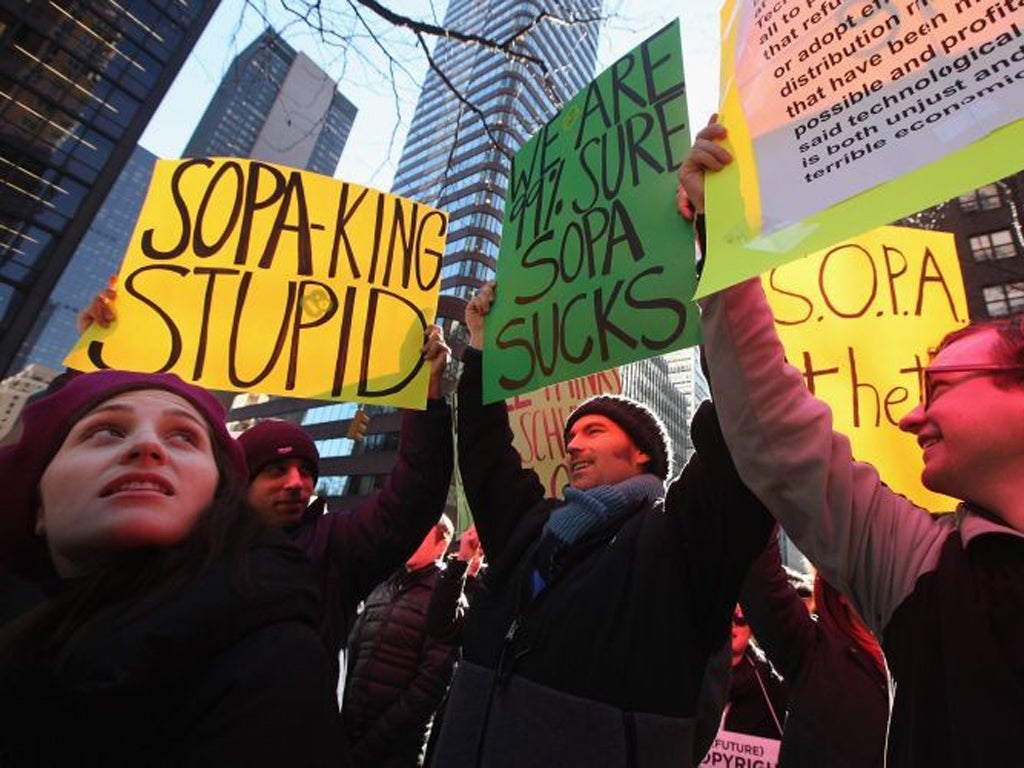Web protest succeeds in halting anti-piracy bills
President Obama had indicated he was unhappy with the wording of the Bills

Your support helps us to tell the story
From reproductive rights to climate change to Big Tech, The Independent is on the ground when the story is developing. Whether it's investigating the financials of Elon Musk's pro-Trump PAC or producing our latest documentary, 'The A Word', which shines a light on the American women fighting for reproductive rights, we know how important it is to parse out the facts from the messaging.
At such a critical moment in US history, we need reporters on the ground. Your donation allows us to keep sending journalists to speak to both sides of the story.
The Independent is trusted by Americans across the entire political spectrum. And unlike many other quality news outlets, we choose not to lock Americans out of our reporting and analysis with paywalls. We believe quality journalism should be available to everyone, paid for by those who can afford it.
Your support makes all the difference.Internet freedom campaigners were celebrating last night after two controversial anti-piracy bills were kicked into the long grass by US lawmakers.
Key backers of the so-called Sopa and Pipa bills said they would postpone any further debates on the laws until a better compromise had been reached. The decision is a victory for a host of prominent websites and internet entrepreneurs, including the Wikipedia founder, Jimmy Wales, who shut down the site all day Wednesday in protest at the laws.
Critics of the legislation maintained that the bills were, in effect, written by lobbyists for the music and film industries, and that they would have forced websites and internet providers to monitor their content to a level that would have restricted freedom of speech.
But movie production studios, television networks and record labels insist that new legislation is needed to tackle the ever-growing presence of pirated material on the internet.
After days of bitter arguments between the two camps, the Senate majority leader, Harry Reid, said he would delay a vote on the Protect Intellectual Property Act (Pipa) which had been scheduled for Tuesday.
He was swiftly followed by the chairman of the House Judiciary Committee, Lamar Smith, who said his panel would not return to discussing the Stop Online Piracy Act (Sopa) until there was greater agreement over its wording.
"It is clear that we need to revisit the approach on how best to address the problem of foreign thieves that steal and sell American inventions and products," Mr Smith said in a statement.
The moves will halt any further progress on the bills until after the US presidential polls in November. It is likely that any new versions of the bills will need big changes to ease concerns about freedom on the internet. President Barack Obama had already indicated that he was unhappy with the current wording of the bills, which could have led to him being forced to use a veto if they had been passed.
The postponement is a dramatic outcome for two pieces of legislation that looked as if they would go through the US Congress relatively unchallenged at the start of the week.
The protest gathered pace when Mr Wales said he would follow the lead of smaller websites and take his website offline for 24 hours on Wednesday. The ensuing media coverage, and the fact that millions of web pages "went dark" overnight, meant that Americans were suddenly confronted with what the two bills could have led to.
Thousands wrote in to their representatives, and by the end of Wednesday a number of key backers of the two bills had withdrawn their support, eventually prompting last night's sudden U-turn in Washington.
One analysis by the ProPublica website revealed the protest's effectiveness. At the start of Wednesday it calculated that there were 80 supporters of the bills in Congress and just 41 representatives who had opposed it. By yesterday, those numbers had changed to just 65 supporters and 101 declared opponents. A further 41 lawmakers were categorised as "leaning no".
Join our commenting forum
Join thought-provoking conversations, follow other Independent readers and see their replies
Comments